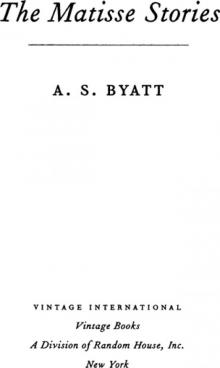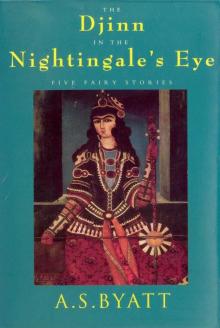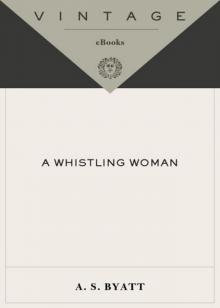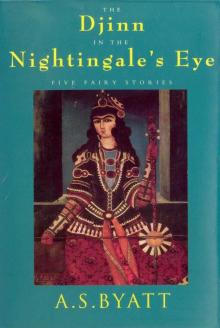- Home
- A. S. Byatt
Sugar and Other Stories Page 2
Sugar and Other Stories Read online
Page 2
Emily stood in front of Miss Crichton-Walker in her study. Between their faces was a silver rose bowl, full of spring flowers. Miss Crichton-Walker was small and straight in a large upright arm chair. She asked Emily what she had been doing on the wall, and Emily said that she had no one to walk home from church with, so came that way. She thought of adding, most girls of my age, in reasonable day schools, can walk alone in a city in the middle of the morning, quite naturally, anybody might. Miss Crichton-Walker said that Emily was arrogant and unsociable, had made little or no effort to fit in with the community ever since she came, appeared to think that the world was made for her convenience. She set herself against everything, Miss Crichton-Walker said, she was positively depraved. Here was another word to add to those others, regrets, aggressive, depraved. Emily said afterwards to Flora Marsh, who asked what had happened, that Miss Crichton-Walker had told her that she was depraved. Surely not, said Flora, and, yes she did, said Emily, she did, that is what she thinks. You may have your own views about whether Miss Crichton-Walker could in sober fact have uttered the word depraved, in her soft, silvery voice, to an awkward girl who had tried to walk alone in mid-morning, to look at a pussy-willow, to think. It may be that Emily invented the word herself, saying it for bravado to Flora Marsh after the event, though I would then argue, in defence of Emily, that the word must have been in the air during that dialogue for her to pick up, the feeling was there, Miss Crichton-Walker sensed her solitude as something corrupt, contaminating, depraved. What was to be done? For the next four weeks, Miss Crichton-Walker said, she would walk back from church with Emily herself. It was clear that she found this prospect as disagreeable as Emily possibly could. She was punishing both of them.
What could they say to each other, the awkward pair, one shuffling downcast, one with a regular inhibited stride? Emily did not regard it as her place to initiate any conversation: she believed any approach would have been unacceptable, and may well have been right. You will think that Miss Crichton-Walker might have taken the opportunity to draw Emily out, to find out why she was unhappy, or what she thought of her education. She did say some things that might have been thought to be part of such a conversation, though she said them reluctantly, in a repressed, husky voice, as though they were hard to bring out. She was content for much the larger part of their four weeks’ perambulation to say nothing at all, pacing it out like prison exercise, a regular rhythmic pavement-tapping with which Emily was compelled to try to keep time. Occasionally spontaneous remarks broke from her, not in the strained, clutching voice of her confidential manner, but with a sharp, clear ring. These were remarks about Emily’s personal appearance for which she felt — it is not too strong a word, though this time it is mine, or Emily’s; Martha Crichton-Walker is innocent of uttering it — she felt disgust. “For the second week running you have a grey line round your neck, Emily, like the scum you deposit round the rim of the bath.” “You have a poor skin, Emily. Ask Sister to give those blackheads some attention: you must have an abnormal concentration of grease in your nasal area, or else you are unusually skimpy in your attention to your personal hygiene. Have you tried medicated soap?” “Your hair is lank, Emily. I do not like to think of the probable state of your hatband.” “May I see your hands? I have never understood how people can bring themselves to bite their nails. How unpleasant and profitless to chew away one’s own flesh in this manner. I see you are imbued with ink as some people are dyed with nicotine: it is just as disagreeable. Perhaps the state of your hands goes some way to explain your very poor presentation of your work: you seem to wallow in ink to a quite unusual extent. Please purchase a pumice stone and a lemon and scour it away before we go out next week. Please borrow a knife from the kitchen and prise away the boot-polished mud from your shoe-heels — that is a lazy way of going on that does not deceive the eye, and increases the impression of slovenliness.’
None of these remarks was wholly unjust, though the number of them, the ingenuity with which they were elaborated and dilated on, were perhaps excessive? Emily imagined the little nose sniffing at the armpits of her discarded vests, at the stains on her pants. She sweated with anxiety inside her serge overcoat, waiting outside Miss Crichton-Walker’s study, and imagined Miss Crichton-Walker could smell her fear rising out of the wool, running down her lisle stockings. Miss Crichton-Walker seemed to be without natural exudations. A whiff of lavender, a hint of mothball.
She talked to Emily about her family. Emily’s family do not come into this story, though you may perhaps be wondering about them, you might need at least to know whether the authority they represented would be likely to reinforce that of Miss Crichton-Walker, or to present some counter-balance, some other form of moral priority. Emily Bray was a scholarship girl, from a large Potteries family of five children. Emily’s father was a foreman in charge of a kiln which fired a curious mixture of teacups thick with lilies of the valley, dinner plates edged severely with gold dagger-shapes, and virulently green pottery dogs with gaping mouths to hold toothbrushes or rubber bands. Emily’s mother had, until her marriage, been an elementary school teacher, trained at Homerton in Cambridge, where she had developed the aspiration to send her sons and daughters to that university. Emily was the eldest of the five children; the next one, Martin, was a mongol. Emily’s mother considered Martin a condign punishment of her aspirations to betterment. She loved him extravagantly and best. The three younger ones were left to their own resources, much of the time. Emily felt for them, and their cramped, busy, noisy little life, some of the distaste Miss Crichton-Walker felt for her, perhaps for all the girls. There are two things to note in this brief summing-up — a hereditary propensity to feel guilty, handed down to Emily from her briefly ambitious mother, and the existence of Martin.
Miss Crichton-Walker knew about Martin, of course. He had been part of the argument for Emily’s scholarship, awarded on grounds of social need, in line with the principles of the school, rather than academic merit. Miss Crichton-Walker, in so far as she wanted to talk to Emily at all, wanted to talk about Martin. Tell me about your brothers and sisters, dear, she said, and Emily listed them, Martin, thirteen, Lorna, ten, Gareth, eight, Amanda, five. Did she miss them, said Miss Crichton-Walker, and Emily said no, not really, she saw them in the holidays, they were very noisy, if she was working. But you must love them, said Miss Crichton-Walker, in her choking voice, you must feel you are, hmm, not properly part of their lives? Emily did indeed feel excluded from the bustle of the kitchen, and more confusedly, more anxiously, from her mother’s love, by Martin. But she sensed, rightly, that Miss Crichton-Walker wished her to feel cut off by the privilege of being at the school, guilty of not offering the help she might have done. She described teaching Amanda to read, in two weeks flat, and Miss Crichton-Walker said she noticed Emily did not mention Martin. Was that because she was embarrassed, or because she felt badly about him? She must never be embarrassed by Martin’s misfortune, said Miss Crichton-Walker, who was embarrassed by Emily’s inkstains and shoemud most sincerely, she must acknowledge her own. I do love him, said Emily, who did, who had nursed and sung to him, when he was smaller, who suffered from his crashing forays into her half-bedroom, from scribbled-on exercises, bath-drowned books. She remembered his heavy amiable twinkle. We all love him, she said. You must try to do so, said Miss Crichton-Walker.
Miss Crichton-Walker had her lighter moments. Some of these were part of the school’s traditional pattern, in which she had her traditional place, such as the telling of the school ghost story at Hallowe’en, a firelit occasion for everyone, in the stark diningroom, by the light of two hundred candles inside the grinning orange skins of two hundred swedes. The girls sat for hours hollowing out these heads, at first nibbling the sweet vegetable, then revolted by it. For days afterwards the school smelled like a byre: during the story-telling the roasting smell of singed turnip overlay the persisting smell of the raw scrapings. For an hour before the storytelling they had their annual time of l
icence, running screaming through the dark garden, in sheets and knitted spiderwebs, jointed paper skeletons and floating batwings. The ghost story concerned an improbable encounter between a Roman centurion and a phantom cow in a venerable clump of trees in the centre of which stood an old and magnificent swing. Anyone meeting the white cow would vanish, the story ran, as in some other time the centurion had vanished, though imperfectly, leaving traces of his presence among the trees, the glimpsed sheen on a helmet, the flutter of his leather skirting. There was always a lot of suppressed giggling during Miss Crichton-Walker’s rendering of this tale, which, to tell the truth, lacked narrative tension and a conclusive climax. The giggling was because of the proliferate embroidered legends which were in everyone’s mind of Miss Crichton-Walker’s secret, nocturnal, naked swinging in that clump of trees. She had once very determinedly, in Emily’s presence, told a group of the girls that she enjoyed sitting naked in her room, on the hearth by the fire in the evening. It is very pleasant to feel the air on your skin, said Miss Crichton-Walker, holding her hands judicially before her chest, fingertips touching. It is natural and pleasant. Emily did not know what authority there was for the legend that she swung naked at night in the garden. She had perhaps once told such a group of girls that she would like to do so, that it would be good and pleasant to swoop unencumbered through the dark air, to touch the lowest branches of the thick trees with naked toes, to feel the cool rush along her body. There were in any case now several stories of her having been solidly seen doing just that, urging herself to and fro, milky-white in the dark. This image, with its moon face and rigid imperturbable curls was much more vivid in Emily’s mind at Hallowe’en than any ghostly cow or centurion. The swing, in its wooden authority and weight, reminded Emily of a gibbet. The storytelling, more vaguely, reminded her of the first evening and the allegorizing of Hodgie’s death.
Their first stirrings of appetite and anxiety, directed at the only vaguely differentiated mass of the brother school’s congregation, aroused considerable efforts of repressive energy in Miss Crichton-Walker. It was said that under a previous, more liberal headmistress, the boys had been encouraged to walk the girls back from church. No one would even have dared to propose this to her. That there were girls who flouted this prohibition Emily knew, though only by remote hearsay. She could not tell one boy from another and was in love with Benedick, with Pierre, with Max Ravenscar, with Mr Knightley. There was an annual school dance, to which the boys were brought in silent, damp-palmed, hunched clumps in two or three buses. Miss Crichton-Walker could not prevent this dance: it was an ancient tradition: the boys’ headmaster and the governors liked it to exist as a sign of educational liberality. But she spoke against it. For weeks before the arrival of the boys she spent her little Saturday evening homilies on warning the girls. It was not clear, from what she said, exactly what she was warning against. She was famous in the Lower Sixth for having managed explicitly to say that if any boy pressed too close, held any girl too tightly, that girl must say composedly ‘Shall we sit this one out?’ Girls rolled on their dormitory beds gasping out this mot in bursts of wild laughter and tones of accomplished parody. (The school was full of accomplished parodists of Miss Crichton-Walker.) They polished their coloured court shoes, scarlet and peacock, and fingered the stiff taffeta folds of their huge skirts, which they wore with demure and provocative silk shirts, and tightly-pulled wide belts. In later years Emily remembered as the centre of Miss Crichton-Walker’s attack on sexual promptings, on the possibilities of arousal, a curiously elaborate disquisition on the unpleasantness and unnatural function of the female razor. She could not bring herself to mention the armpits. She spoke at length, with an access of clarity and precision, about the evil effects on the skin of frequent shaving of the legs, which left “as I know very well, an unsightly dark stubble, which then has to be treated more and more frequently, once you have shaved away the first natural soft down. Any gardener will tell you that grass grows coarser after it has once been cut. I ask all the girls who have razors in the school to send them home, please, and all girls to ask their parents not to send such things through the post.” It was also during the weeks preceding the dance that she spoke against deodorants, saying that they were unnecessary for young girls and that the effects of prolonged chemical treatment of delicate skin were not yet known. A little talcum powder would be quite sufficient if they feared becoming heated.
I am not going to describe the dance, which was sad for almost all of them, must have been, as they stood in their resolutely unmingled ranks on either side of the grey school hall. Nothing of interest really happened to Emily on that occasion, as she must, in her secret mind, have known it would not. It faded rapidly enough in her memory, whereas Miss Crichton-Walker’s peculiar anxiety about it, even down to her curious analogy between razors and lawn-mowers, remained stamped there, clear and pungent, an odd and significant trace of the days of her education. In due course this memory accrued to itself Emily’s later reflections on the punning names of depilatories, all of which aroused in her mind a trace-image of Miss Crichton-Walker’s swinging, white, hairless body in the moonlight. Veet. Immac. Nair. Emily at the time of the static dance was beginning to sample the pleasures of being a linguist. Nair sounded like a Miltonic coinage for Satanic scaliness. Veet was a thick English version of French rapidity and discreet efficiency. Immac, in the connexion of Miss Crichton-Walker, was particularly satisfying, carrying with it the Latin, maculata, stained or spotted, immaculata, unstained, unspotted, and the Immaculate Conception, which, Emily was taught at this time, referred to the stainless or spotless begetting of the Virgin herself, not to the subsequent self-contained, unpunctured, manless begetting of the Son. The girls in the dormitories were roused by Miss Crichton-Walker to swap anecdotes about Veet, which according to them had ‘the — most — terrible — smell’ and produced a stinking slop of hairy grease. No one sent her razor home. It was generally agreed that Miss Crichton-Walker had too little bodily hair to know what it was to worry about it.
Meanwhile, and at the same time, there was Racine. You may be amused that Miss Crichton-Walker should simultaneously ban ladies’ razors and promote the study of Phèdre. It is amusing. It is amusing that the same girls should already have been exposed to the betrayed and betraying cries of Ophelia’s madness. ‘Then up he rose, and doffed his clothes, and dupped the chamber door. Let in the maid that out a maid, never departed more.’ It is the word ‘dupped’ that is so upsetting in that little song, perhaps because it recalls another Shakespearean word that rhymes with it, Iago’s black ram tupping the white ewe, Desdemona. Get thee to a nunnery, said Hamlet, and there was Emily, in a nunnery, never out of one, in a rustle of terrible words and delicate and gross suggestions, the stuff of her studies. But that is not what I wanted to say about Racine. Shakespeare came upon Emily gradually, she could accommodate him, he had always been there. Racine was sudden and new. That is not it, either, not what I wanted to say.
Think of it. Twenty girls or so — were there so many? — in the A level French class, and in front of each a similar, if not identical small, slim greenish book, more or less used, more or less stained. When they riffled through the pages, the text did not look attractive. It proceeded in strict, soldierly columns of rhymed couplets, a form disliked by both the poetry-lovers and the indifferent amongst them. Nothing seemed to be happening, it all seemed to be the same. The speeches were very long. There appeared to be no interchange, no battle of dialogue, no action. Phèdre. The French teacher told them that the play was based on the Hippolytus of Euripides, and that Racine had altered the plot by adding a character, a young girl, Aricie, whom Hippolytus should fall in love with. She neglected to describe the original play, which they did not know. They wrote down, Hippolytus, Euripides, Aricie. She told them that the play kept the unities of classical drama, and told them what these unities were, and they wrote them down. The Unity of Time = One Day. The Unity of Space = One Place. The Unity of Action
= One Plot. She neglected to say what kind of effect these constrictions might have on an imagined world: she offered a half-hearted rationale she clearly despised a little herself, as though the Greeks and the French were children who made unnecessary rules for themselves, did not see wider horizons. The girls were embarrassed by having to read this passionate sing-song verse aloud in French. Emily shared their initial reluctance, their near-apathy. She was later to believe that only she became a secret addict of Racine’s convoluted world, tortuously lucid, savage and controlled. As I said, the imagination of the other girls’ thoughts was not Emily’s strength. In Racine’s world, all the inmates were gripped wholly by incompatible passions which swelled uncontrollably to fill their whole universe, brimming over and drowning its horizons. They were all creatures of excess, their secret blood burned and boiled and an unimaginably hot bright sun glared down in judgment. They were all horribly and beautifully interwoven, tearing each other apart in a perfectly choreographed dance, every move inevitable, lovely, destroying. In this world men and women had high and terrible fates which were themselves and yet greater than themselves. Phèdre’s love for Hippolyte was wholly unnatural, dragging her world askew, wholly inevitable, a force like a flood, or a conflagration, or an eruption. This art described a world of monstrous disorder and excess and at the same time ordered it with iron control and constrictions, the closed world of the classical stage and the prescribed dialogue, the flexible, shining, inescapable steel mesh of that regular, regulated singing verse. It was a world in which the artist was in unusual collusion with the Reader, his art like a mapping trellis between the voyeur and the terrible writhing of the characters. It was an austere and adult art, Emily thought, who knew little about adults, only that they were unlike Miss Crichton-Walker, and had anxieties other than those of her tired and over-stretched mother. The Reader was adult. The Reader saw with the pitiless clarity of Racine — and also with Racine’s impersonal sympathy — just how far human beings could go, what they were capable of.

 The Children's Book
The Children's Book Babel Tower
Babel Tower The Matisse Stories
The Matisse Stories Peacock & Vine: On William Morris and Mariano Fortuny
Peacock & Vine: On William Morris and Mariano Fortuny Elementals: Stories of Fire and Ice
Elementals: Stories of Fire and Ice Sugar and Other Stories
Sugar and Other Stories Possession
Possession Little Black Book of Stories
Little Black Book of Stories The Djinn in the Nightingale's Eye
The Djinn in the Nightingale's Eye The Virgin in the Garden
The Virgin in the Garden The Game
The Game The Biographer's Tale
The Biographer's Tale A Whistling Woman
A Whistling Woman Ragnarok
Ragnarok Angels & Insects: Two Novellas
Angels & Insects: Two Novellas Ragnarok: the End of the Gods (Myths)
Ragnarok: the End of the Gods (Myths) Peacock & Vine
Peacock & Vine The Djinn in the Nightingale's Eye (Vintage International)
The Djinn in the Nightingale's Eye (Vintage International) Angels and Insects
Angels and Insects The Arabian Nights: Tales from a Thousand and One Nights (Modern Library Classics)
The Arabian Nights: Tales from a Thousand and One Nights (Modern Library Classics) Elementals
Elementals